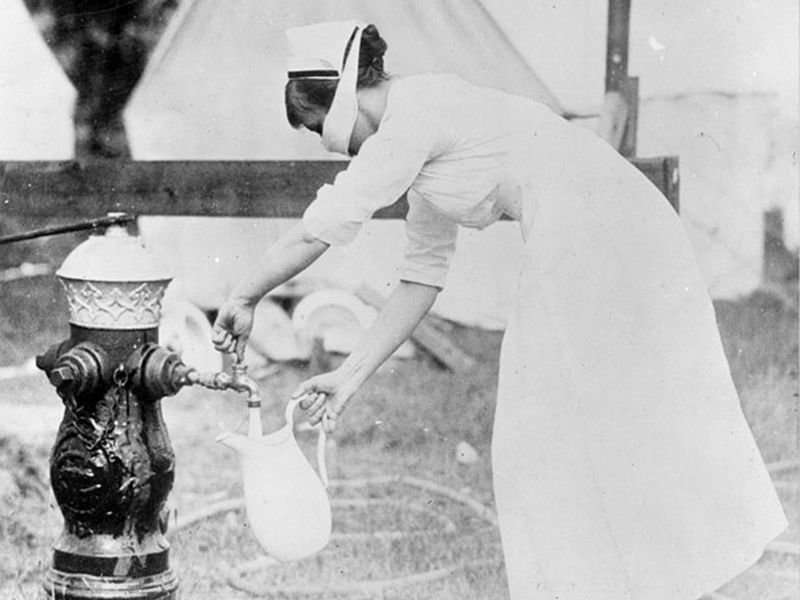It's a century since the 1918 flu pandemic - could it happen again?

(HealthDay)—One hundred years ago, the deadliest influenza pandemic of all time made a ravaging march across the globe.
The "Spanish" flu of 1918-19 infected an estimated one-third of the world's population and killed between 50 million and 100 million people, modern epidemiologists estimate.
That raises the inevitable question as the United States battles its way through another severe flu season—could a pandemic as devastating in scope occur in the future?
It's "100 percent" certain that another global flu crisis will happen, said Dr. Greg Poland, a virologist and vaccine researcher with the Mayo Clinic in Rochester, Minn.
"There's absolutely no controversy that we will have another pandemic," Poland said. "What's unpredictable is the severity of it."
Poland is concerned that a new and deadly strain of flu could emerge that would sweep across the planet, erasing every advantage that modern medicine has given doctors in treating the flu.
"I've learned after 30 years of studying this virus is there's next to nothing predictable about it, and when you begin to feel comfortable, you're well on the road to bad things happening," Poland said.
The 1918 influenza pandemic killed more people than any other disease outbreak in human history, according to "The Great Influenza," a definitive account written by historian John Barry.
"Influenza killed more people in a year than the Black Death of the Middle Ages killed in a century," Barry wrote. "It killed more people in 24 weeks than AIDS has killed in 24 years."
Medical Advances Might Make a Difference
Many medical advances since 1918 have improved people's ability to survive a flu infection, including antivirals and antibiotics, ventilators and vaccinations to protect against both the flu and pneumonia, said Dr. Nicole Bouvier. She's an associate professor of infectious diseases at the Icahn School of Medicine at Mount Sinai in New York City.
"We have good supportive care to nurse people through an acute and horrible case of flu," Bouvier said. "We're better able to get people through a critical illness than we were in 1918."
Additionally, the 1918 influenza virus—an H1N1 strain—seems to have been more virulent than any flu that's since gone on to cause a pandemic, Bouvier said.
In fact, the 1918 flu was so bad that it has echoed through history. Epidemiologists believe almost all animal-derived influenza cases that have occurred since were caused by strains descended from the 1918 virus.
"It certainly is possible that a flu virus could again arise in the animal reservoir that is more pathogenic than the typical flu," Bouvier said.
This Flu Season Points to Potential Problems
If such a deadly strain rises, the response to this year's severe flu season has revealed that health care professionals may be ill-equipped to respond to it, Poland argued.
He pointed to recent reports of overrun hospitals setting up makeshift facilities, spot shortages of antiviral medications, and a nationwide shortage of IV bags caused by Hurricane Maria in Puerto Rico.
On top of that, there are other concerns that would only arise in the event of a 1918-like influenza, Poland added. He doubted there are enough ventilators to respond to such a scenario, and pointed to evidence that shows many health care workers would not go to work in the face of a virus that lethal.
"Much of antibiotic manufacture, virtually all the chemicals required for that come outside of the U.S., and it's all done on a just-in-time inventory method," Poland said. "Make the people who run the ships and the airplanes sick—now what?"
The history of the 1918 pandemic shows that humans do have one very strong advantage in responding to a dangerous new flu strain, Poland said—the modern rite of annual flu vaccination.
Vaccines Best Weapon in Modern Flu Arsenal
In 1918, the flu was particularly deadly to people in their 20s and 30s, and epidemiologists theorize that's because they hadn't previously come into contact with similar influenza viruses.
"Those who have received immunizations in the past do, on average, better than those who haven't," Poland said. "They build up some immunologic imprinting and memory that serves to help ensure they survive."
In other words, the flu shots you've gotten in the past will increase your chances of survival, even if you come down with a nastier strain of flu.
In the meantime, medical science has continued to improve its response to influenza, Bouvier said.
Most developed nations are sitting on stockpiles of antivirals that work against flu, and new antiviral drugs are in the research pipeline, Bouvier said.
"If the pandemic doesn't happen for another five years, we'll have a whole other set of drugs that work in a different way against flu," Bouvier said.
Other research has focused on new technologies that can cut vaccine development time down from six months to two months, she added.
"We'll be able to churn out vaccine much more quickly than we were in the last pandemic in 2009," Bouvier said.
Overall, Bouvier believes health officials are better prepared today because the 1918 influenza occurred.
"Having gone through it once, having seen how bad it could be, has made people in the public health and governmental sphere aware of how bad flu can be," she said. "That may be the biggest lesson we have learned, to not underestimate how bad flu can be."
More information: Greg Poland, M.D., virologist and vaccine researcher, Mayo Clinic, Rochester, Minn.; Nicole Bouvier, M.D., associate professor, infectious diseases, Icahn School of Medicine at Mount Sinai, New York City; "The Great Influenza: The Story of the Deadliest Pandemic in History," John M. Barry, Penguin Books, 2004
For more on the 1918 flu pandemic, visit the U.S. Centers for Disease Control and Prevention.
Copyright © 2018 HealthDay. All rights reserved.















